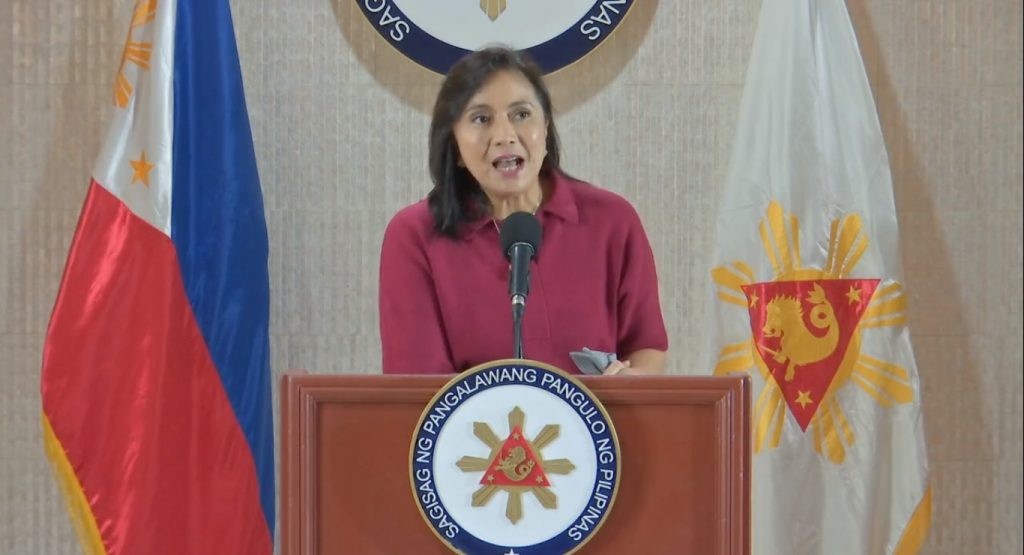Media’s missed cues: How Robredo’s report on drug war was above politics

VICE PRESIDENT Leni Robredo’s report of her findings about the government’s controversial anti-illegal drug campaign was carefully written to focus on substantive observations. She employed a style devoid of rhetorical flourish. The report itself is free of any innuendo suggesting that any official had done wrong. In noting the lapses and gaps in the implementation of the program, the text is straightforward, with little tone or color. Its narrative concludes with recommendations to address the issues raised by the report.
Released on January 6, the report could have initiated a new level of discourse, moving the discussion about the controversial methods that President Rodrigo Duterte has used to fight illegal drugs since 2016, and placed the issue above politics.
But media coverage lined up talking heads, most of whom ignored the report itself while dismissing its value. Once again, the press did not see its task apart from that of recording what personalities, mostly government officials, had to say about the report, establishing the lead provided by the initial remarks of officials of the Philippine Drug Enforcement Agency (PDEA), the Philippine National Police (PNP) and the President’s Office.
The statements were reactions not so much to the report, which at the time few could have read with attention. They were reacting to the Vice President’s press conference, and even just to Robredo herself. Almost to a man, these officials dismissed the value of her findings.
These findings were based on data that Robredo got from the Inter-Agency Committee on Anti-Illegal Drugs (ICAD) during her brief stint as its co-chair in November 2019. Her report echoed the president’s admission that the program, on which he had anchored his administration from the very beginning, was a failure. No less than Duterte himself said in August 2018 that he does not see the narcotics problem solved by the end of his term. In March 2019, he lamented that “things have worsened”.
As ICAD’s co-chair for a mere two weeks, Robredo attempted to put in place an evidence-based approach in addressing a problem as complex as the eradication of illegal drugs. A multifaceted issue, it requires a holistic approach to address its different aspects which, other than law enforcement, include advocacy against the narcotics menace, the dispensation of justice, and the rehabilitation and reintegration into society of drug dependents – factors that the mere arrest or worse, killing of drug personalities for which the “war on drugs” has been characterized, cannot address.
But the media in general failed to discuss the merits of Robredo’s analytical review, the contents of which should have been the main focus of their coverage. Most reports seemed concerned only in focusing on what Robredo’s detractors had to say rather than looking into how her findings could help recalibrate the government’s approach on the narcotics problem.
In that sense, media were complicit in the politicization of the drug issue, which has characterized the public discourse about the problem.
CMFR monitored reports from the three main broadsheets (Manila Bulletin, the Philippine Daily Inquirer and The Philippine Star); primetime newscasts (ABS-CBN 2’s TV Patrol, CNN Philippines’ News Night, GMA-7’s 24 Oras and TV5’s Aksyon); as well as selected news websites from January 6 to 12, 2020.
Fleeting media attention, overlooked merits
Much of the coverage relied on the points made by Robredo during her press conference on January 6; among these were the government’s shortcomings in curbing the narcotics supply, the gaps in the “drug war” data, as well as some of her recommendations for the improvement of the government’s anti-drug strategy. Media reports highlighted the manifest rejection by relevant officials, particularly from Malacañang, PDEA and PNP, of the findings indicated in Robredo’s report.
The succeeding days were an opportune time for the media to unpack and explain the contents of Robredo’s report. But most of the subsequent news accounts focused on the reactions to the report, reducing the coverage to merely who said what.
One exception was Rappler’s January 7 report which presented a simplified account of the points raised by Robredo. The article put side by side the problems with its corresponding proposed solutions accompanied by brief explainers. This approach eliminated the clutter and directed the public to the key contents of Robredo’s report, making it easier to appreciate the findings.
As the week drew to a close, the topic was overtaken by other news events such as the annual Traslacion of the Black Nazarene, and later the eruption of Taal Volcano in Batangas. Unfortunately, these developments may have signaled the end of Robredo’s report itself in the news agenda.
“War on drugs” moving forward
If so, this would be a loss for all the agencies working on the drug problem.
On January 10, PDEA spokesperson Derrick Carreon, in an interview on ANC’s Early Edition, said that the ICAD has been tasked to take note of Robredo’s points and to submit a report on how they would act on these. He said, “If there are points of improvement to the campaign, we are definitely open to such recommendations.”
The report then provided a good reference point with which to track the key issues in the anti-drug campaign. Carreon suggested that the ICAD is working to act with reference to such recommendations.
Media’s reassessment of the controversial “war on drugs” is in order. Public opinion polls indicate how affected communities have strongly disapproved of the killing of suspects as well as their support for community-based efforts to provide rehabilitation for drug dependents.
Guided by the points raised by Robredo, it is then up to the media to follow through with reporting on the work of government agencies charged with the implementation of the drug campaign. Such media coverage would be above politics and in the public interest.
Leave a Reply